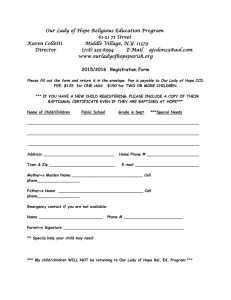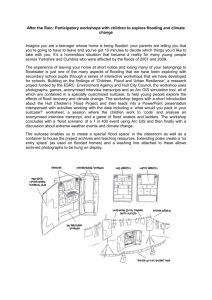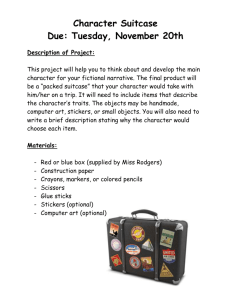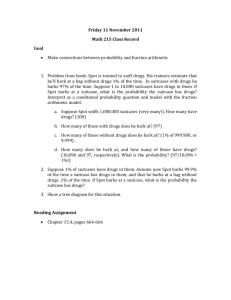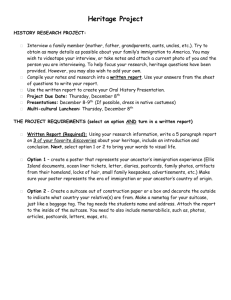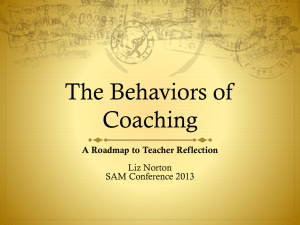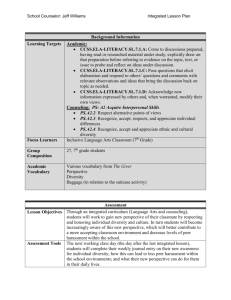"Suitcase Lady" and Questions
advertisement
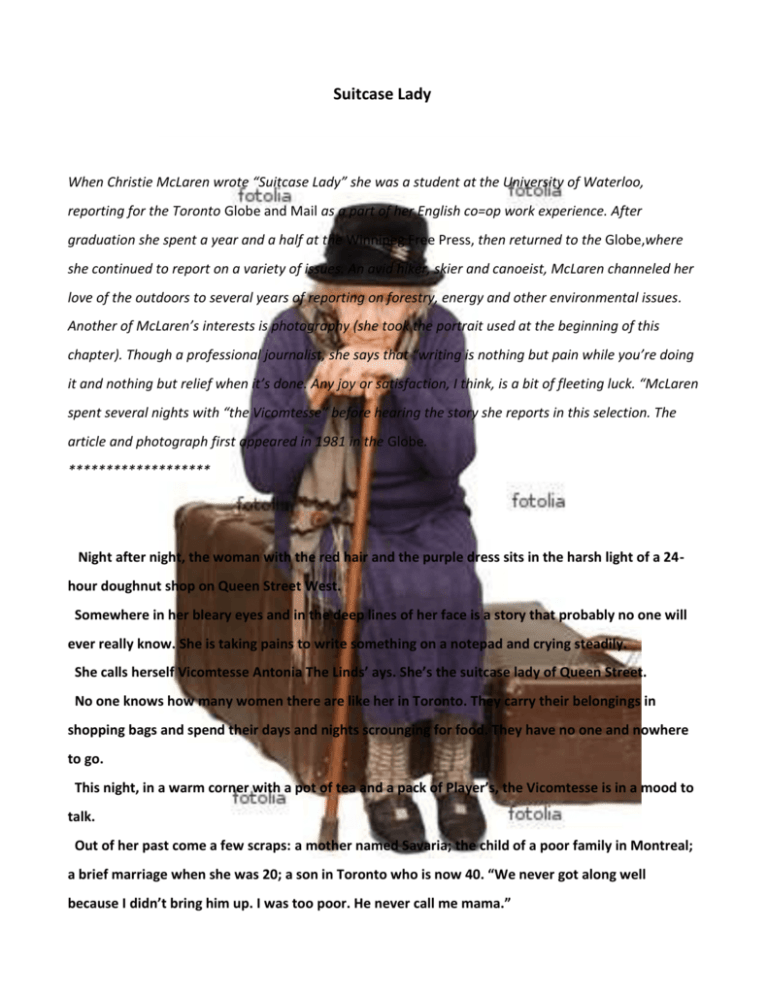
Suitcase Lady When Christie McLaren wrote “Suitcase Lady” she was a student at the University of Waterloo, reporting for the Toronto Globe and Mail as a part of her English co=op work experience. After graduation she spent a year and a half at the Winnipeg Free Press, then returned to the Globe,where she continued to report on a variety of issues. An avid hiker, skier and canoeist, McLaren channeled her love of the outdoors to several years of reporting on forestry, energy and other environmental issues. Another of McLaren’s interests is photography (she took the portrait used at the beginning of this chapter). Though a professional journalist, she says that “writing is nothing but pain while you’re doing it and nothing but relief when it’s done. Any joy or satisfaction, I think, is a bit of fleeting luck. “McLaren spent several nights with “the Vicomtesse” before hearing the story she reports in this selection. The article and photograph first appeared in 1981 in the Globe. ******************* Night after night, the woman with the red hair and the purple dress sits in the harsh light of a 24hour doughnut shop on Queen Street West. Somewhere in her bleary eyes and in the deep lines of her face is a story that probably no one will ever really know. She is taking pains to write something on a notepad and crying steadily. She calls herself Vicomtesse Antonia The Linds’ ays. She’s the suitcase lady of Queen Street. No one knows how many women there are like her in Toronto. They carry their belongings in shopping bags and spend their days and nights scrounging for food. They have no one and nowhere to go. This night, in a warm corner with a pot of tea and a pack of Player’s, the Vicomtesse is in a mood to talk. Out of her past come a few scraps: a mother named Savaria; the child of a poor family in Montreal; a brief marriage when she was 20; a son in Toronto who is now 40. “We never got along well because I didn’t bring him up. I was too poor. He never call me mama.” She looks out the window. She’s 60 years old. With her words she spins herself a cocoon. She talks about drapes and carpets, castles and kings. She often lapses into French. She lets her tea get cold. Her hands are big, rough, farmer’s hands. How she ended up in the doughnut shop remains a mystery, maybe even to her. “Before, I had a kitchen and a room and my own furniture. I had to leave everything and go.” It’s two years that she’s been on the go, since the rooming houses stopped taking her. “I don’t have no place to stay.” So she walks. A sturdy coat covers her dress and worn leather boots are on her feet. But her big legs are bare and chapped and she has a ragged cough. Yes, she says, her legs get tired. She has swollen ankles and, with no socks in her boots, she has blisters. She says she has socks—in the suitcase—but they make her feet itch. As for money, “I bum on the street. I don’t like it, but I have to. I have to survive. The only pleasure I got is my cigarette.“ She lights another one. “It’s not a life.” She recalls the Saturday, a long time ago, when she made $27, and laughs when she tells about how she had to make the money last through Sunday, too. Now she gets “maybe $7 or $8,” and eats “very poor.” When she is asked how people treat her, the answer is very matter-of-fact: “Some give money. Some are very polite and some are rude.” In warm weather, she passes her time at the big square in front of City Hall. When it’s cold she takes her suitcase west to the doughnut shop. The waitresses who bring food to the woman look upon her with compassion. They persuaded their boss that her sitting does no harm. Where does she sleep? “Any place I can find a place to sleep. In the park, in stores—like here I stay and sit, on Yonge Street.” She shrugs. Sometimes she goes into an underground parking garage. She doesn’t look like she knows what sleep is. “This week I sleep three hours in four days. I feel tired but I wash my face with cold water and I feel okay.” Some questions make her eyes turn from the window and stare hard. Then they well over with tears. Like the one about loneliness. “I don’t talk much to people,” she answers. “Just the elderly, sometimes, in the park.” Her suitcase is full of dreams. Carefully, she unzips it and pulls out a sheaf of papers—“my concertos.” Each page is crammed with neatly written musical notes—the careful writing she does on the doughnut shop table—but the bar lines are missing. Questions about missing bar lines she tosses aside. Each “concerto” has a French name—Tresor, La Tempete, Le Retour—and each one bears the signature of the Vicomtesse. She smiles and points to one. “A very lovely piece of music. I like it.” She digs in her suitcase again, almost shyly, and produces a round plastic box. Out of it emerges a tiara. Like a little girl, she smooths back her dirty hair and proudly puts it on No one in the doughnut shop seems to notice. She cares passionately about the young, the old and the ones who suffer. So who take care of the suitcase lady? “God takes care of me, that’s for sure,” she says, nodding thoughtfully. “But I’m not what you call crazy about religion. I believe always try to do the best to help people—the elderly, and kids, and my country, and my city of Toronto, Ontario.” - by Christie McLaren Questions: 1. In the opening sentence of this passage, the expression “harsh light” suggests that the light is a. stangely coloured b. constantly flashing c. too weak to read by d. uncofomfortably bright 2. Which of the following quotations LEAST contributes to the impression that the suitcase lady is unhealthy? a. “Somewhere in her bleary eyes” a. other raised him be cause his mother was too poor to do so b. when he was young, he constantly argued with his mother c. he was embarrassed by his mother’s wretched poverty d. he never found out who his natural mother was 5. The phrase “With her words she spins herself la cocoon” contains which of the following figures of speech? b. “The deep lines of her faces” a. Pun c. “And crying steadily” b. Metaphor d. “ I wash my face with cold c. Hyperbole water” 3. In context, the quotation “Out of her past come a few scraps” refers to the fact that the suitcase lady a. remembers disjointed bits of her unhappy life b. shows some of the items she has in her suitcase c. has had many fights with formerly intimate friends d. is an insignificant and discarded member of society 4. The MOST LIKELY reason the lady’s son never called her “mama” is that d. Personification 6. The MOST LIKELY meaning of the quotation “With her words she spins herself a cocoon” is a. a web of lies has been the cause of her wretched state b. a maze of confusion is the result of her confused speech c. she imagines that other people believe that she is rolyalty d. she creates a closed ansafe splace of conforting thoughts 7. According to details in the passage, the suitcase lady’s only pleasure is a. smoking cigarettes a. Naiveté b. talking to older people she b. Courage meets c. writing interesting musical scores d. sitting quietly in the doughnut shop 8. The phrase “When she is asked how c. Foolishness d. Cleanliness 11. The quotation “I don’t have no place to stay” contains which of the following types of grammatical error? people treat her, the answer is very a. Double negative matter-of-fact,” the description b. Sentence fragment “matter-of-fact” suggests that she is c. Misplaced modifier a. conversing confidently and optimistically b. emotionally citing a string of troubling facts c. calmly and unemotionally recalling experiences d. listing details associated with a variety of themes 9. The use of the word “compassion” in the quotation “The waitresses… look d. Incorrect pronoun choice 12. The concluding paragraph of the passage contains several examples of which of the following literary techniques? a. Irony b. Paradox c. Oxymoron d. Onomatopoeia 13. The words “staggered”, “ground”, upon her with compassion” suggests “plodded” are MOST LIKELY used that the waitresses are to convey a feeling of a. shy a. liberation b. nervous b. conviction c. irritated c. exhaustion d. considerate d. anticipation 10. Which of the following character traits can be identified in the suitcase 14. In this passage, the narrative point of view is lady’s remark “I feel tired but I wash a. objective my face with cold water and I feel b. omniscient okay”? c. first person d. limited omnicient

